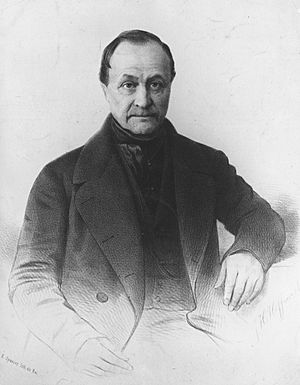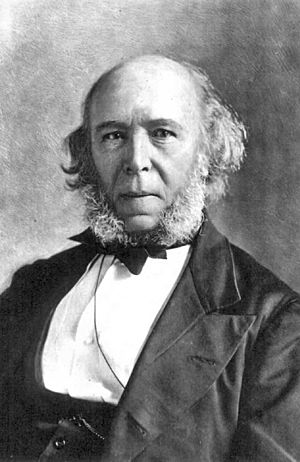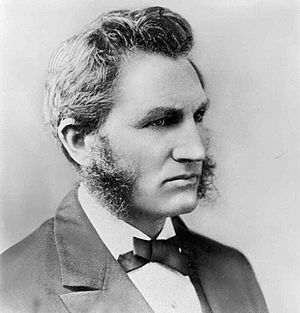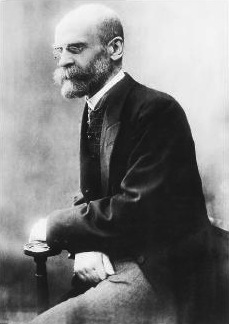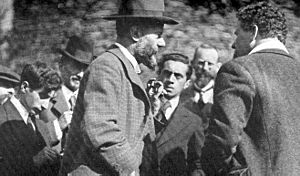Sociocultural evolution facts for kids
Sociocultural evolution is about how societies and cultures change over time. Think of it like how living things evolve, but instead of animals, it's about how groups of people and their ways of life develop.
Sometimes, these changes make societies more complex, like building bigger cities or creating new technologies. Other times, changes can make things simpler, or just different, without necessarily becoming more complex. It's all about how societies reorganize and become something new over time.
In the past, many thinkers believed that all human societies followed the same path, moving through different stages of development. They often thought that Western societies were the most "advanced." However, modern experts now focus on how each society changes in its own unique way, rejecting the idea that all cultures must follow one single path. Today, scientists who study this topic look at how societies adapt to their environments and how technology plays a role in their development.
Contents
How Societies Change Over Time
Experts who study people and societies often believe that humans naturally live in groups. They also think that many human behaviors are learned from others, not just passed down through genes. Societies live in complex environments, with natural resources and challenges. Because of this, all societies have to change and adapt.
Some older ideas about how societies change tried to explain differences between groups by saying they were at different "stages" of development. These ideas often linked technology, social rules, and values. However, they didn't always explain how these changes actually happened.
Early ideas about sociocultural evolution came from thinkers like Auguste Comte and Herbert Spencer in the 1800s. These ideas grew around the same time as Charles Darwin's work on biological evolution, but they developed separately. These 19th-century theories often suggested that societies started out "primitive" and slowly became more "civilized." They saw Western culture and technology as the ultimate goal of progress. Sadly, some of these early ideas led to harmful theories like "social Darwinism," which were sometimes used to justify unfair practices like colonialism.
Most modern studies of social change look at how individual societies change, rather than trying to fit all of humankind into one single evolutionary model. They don't believe that change always moves in one specific direction.
Richard Dawkins, a famous scientist, wrote in his 1976 book The Selfish Gene that while some animals show cultural evolution, humans truly show how much cultural evolution can do.
Stages of Society's Development
Many thinkers from the 1700s and later believed that societies moved through different stages. They saw history as a series of steps forward. They thought that societies started in a simple, "natural" state and then grew to become like the industrial countries of Europe.
The idea of sociocultural evolution really grew in Scotland in the 1700s. After Scotland joined with England in 1707, thinkers like Adam Ferguson and Adam Smith wondered about the link between progress and the wealth that came from more trade. They saw Scotland changing from a farming society to one focused on business. These thinkers suggested that all societies go through four stages:
- Hunting and gathering (finding food in nature)
- Pastoralism and nomadism (herding animals and moving around)
- Agriculture (farming)
- Commerce (buying and selling goods)
In France, thinkers like Auguste Comte also developed ideas about social progress. Comte even created a new field of study called sociology to understand it.
These ideas developed during two big historical changes:
- Colonialism: European powers were taking control of lands around the world. This made Europeans more aware of non-Western peoples. The new theories of sociocultural evolution helped Europeans organize their knowledge in a way that made their control seem fair. They often saw colonized people as less evolved.
- Industrial Revolution and Capitalism: These changes in Europe led to new ways of making things and doing business. Thinkers believed these changes were improvements. The Industrial Revolution, along with political changes like the French Revolution, made Europeans rethink how society was organized.
In the 1800s, three main theories of social change appeared:
- Sociocultural evolutionism
- Social cycle theory (societies go through cycles)
- Marxist theory of historical materialism (economic factors drive history)
All these theories shared one idea: human history follows a set path, usually towards progress. They believed that by understanding past events, we could find the "laws" of history.
Early Ideas of Progress
Early sociocultural evolutionists believed that societies evolve towards progress. Many different theories, called "unilineal evolution," were developed. This idea was popular with scholars like Auguste Comte, Herbert Spencer, and Lewis Henry Morgan. They thought societies progressed through fixed "stages," often listed as savagery, barbarism, and civilization. At this time, anthropology was becoming a new science, moving away from old religious views of "primitive" cultures.
Some thinkers in the 1700s began to theorize about human evolution. Montesquieu, for example, wrote about how laws and cultures were influenced by climate and environment. He thought that as societies became more complex, humans were less controlled by their environment and more by moral and legal rules. Jean-Jacques Rousseau also suggested stages of human evolution, from solitary living to families, then tribes, and finally, the "corruption" of civil society.
Erasmus Darwin, Charles Darwin's grandfather, was a very influential thinker. He believed that everything evolved, including culture. His work suggested that cultural development was part of a universal process of growth.
In the mid-1800s, scholars started comparing "primitive" cultures to past societies. They saw their technology as similar to Stone Age cultures. This led to the idea that modern "savages" were like living fossils, showing earlier stages of human evolution. Herbert Spencer, who coined the phrase "survival of the fittest," was a key figure. His ideas were similar to Lamarck's, believing that humans adapt to their surroundings over time.
Both Spencer and Comte saw society as a living thing that grows from simple to complex, from chaos to order. They believed this growth was social progress, meaning each new, more evolved society was "better." This idea of progress became central to sociocultural evolutionism.
Spencer believed that society's evolution led to a racial hierarchy, with Caucasians at the top. These views were linked to the colonial projects of European powers, justifying their control by claiming European superiority.
Lewis H. Morgan, an important anthropologist, wrote in his 1877 book Ancient Societies about three eras: savagery, barbarism, and civilization. He linked these stages to technological inventions like fire, the bow, and pottery in the savage era; animal domestication, agriculture, and metalworking in the barbarian era; and the alphabet and writing in the civilization era. Morgan believed that technological progress drove social progress. His ideas were later used by Friedrich Engels, influencing Marxist theory.
Edward Burnett Tylor, another early anthropologist, focused on the evolution of culture worldwide. He believed that cultures evolve and that anthropology's goal was to trace this evolution from simple beginnings to modern times.
Tylor and Morgan used data from indigenous peoples, believing these groups represented earlier stages of cultural evolution. Their work was based on three main ideas:
- Societies can be ranked as more "primitive" or more "civilized."
- There are a set number of stages between "primitive" and "civilized" (like band, tribe, chiefdom, and state).
- All societies go through these stages in the same order, but at different speeds.
They often measured progress by how complex a society became, including how specialized people's jobs were, or how advanced their ideas about religion and art were.
Lester Frank Ward, sometimes called the "father" of American sociology, disagreed with many of Spencer's ideas. Ward believed that evolution worked differently in human societies than in nature. He thought that humans, driven by emotions, set goals and used science to achieve them. While plants and animals adapt to nature, humans change nature. Ward saw competition as destructive, arguing that human inventions like laws were designed to control it. He believed that modern democratic societies, which valued science, could help individuals use their talents and find happiness.
Ward saw four stages of evolution:
- Cosmogenesis: The creation and evolution of the world.
- Biogenesis: When life appears.
- Anthropogenesis: The development of humanity, influenced by the human mind.
- Sociogenesis: The science of guiding social evolution to improve human happiness.
Ward thought modern societies were better than "primitive" ones (for example, in health and lifespan). However, he rejected ideas of white supremacy and believed all races were equally talented. He also worried that societies could decline, as seen in history.
Émile Durkheim, another "father" of sociology, saw social progress as a move from mechanical solidarity to organic solidarity.
- In mechanical solidarity, people are self-sufficient, and society is held together by force.
- In organic solidarity, people are more connected and depend on each other, with many specialized jobs.
This progress is driven by population growth, more complex social interactions, and increased specialization in work.
Ferdinand Tönnies described evolution as moving from informal societies (with many freedoms) to modern, formal societies (ruled by traditions and laws). He also noted a trend towards standardization, where smaller societies are absorbed into larger ones, a process similar to what we now call globalization. Tönnies was one of the first to suggest that social evolution might not always be good, and that progress could come at a high cost, making individuals less satisfied.
Max Weber, though not strictly an evolutionist, had a theory of authority that can be seen as evolutionary. He identified three types of political leadership:
- Charismatic domination: Based on the leader's special qualities.
- Traditional domination: Based on old customs (like kings or feudal lords).
- Legal (rational) domination: Based on modern laws and bureaucracy.
Weber believed that societies evolve from traditional and charismatic authorities to more rational and legal ones.
Criticisms of Early Theories
In the early 1900s, many experts started to criticize and reject the broad ideas of unilineal evolution. Anthropologists like Franz Boas and his students argued that these theories were based on guesses and didn't accurately represent real cultures. They especially criticized the idea of "stages" of evolution as being misleading.
They also rejected the idea of "primitive" versus "civilized" societies. They pointed out that so-called primitive societies had just as much history and were just as evolved as "civilized" ones. They argued that trying to guess the history of groups without written records using these theories was unscientific.
Critics also noted that the idea of progress, which always ended with modern Europe as the ideal, was ethnocentric (meaning it judged other cultures based on one's own). They also pointed out that cultures often share ideas and traits across their borders, so societies aren't always clearly separate.
Later critics observed that the idea of clearly defined societies was convenient for European powers who were colonizing non-Western societies. Many experts now see unilineal cultural evolution as a Western myth, not based on strong evidence. Some argue that ideas of social evolution were simply ways for powerful groups to justify their control. Finally, the devastating World Wars (1914-1945) made people question the idea of constant progress.
So, modern sociocultural evolution rejects most of the early ideas because of several problems:
- It was very ethnocentric, seeing Western culture as the best.
- It assumed all cultures follow the same path and have the same goals.
- It linked civilization mainly to technology and cities.
Because social evolution was presented as a scientific theory, it was often used to support unfair and racist practices like colonialism, slavery, and economic inequality. Social Darwinism, in particular, is criticized for leading to harmful ideas.
Max Weber and Modern Society
Max Weber's work looked at how modern Western society became more rational and less focused on tradition or emotion. This process, called "rationalization," means that more and more actions are based on efficiency and calculation, rather than on feelings, customs, or beliefs. Weber saw this as a key part of modernity, especially in capitalism, government, science, and technology.
Weber's ideas about rationalization, combined with Marxist ideas, influenced "critical theory." Critical theorists question the idea of a hierarchy of sciences or societies. For some, like Zygmunt Bauman, rationalization in modern times can even be linked to terrible events like the Holocaust.
Modern Ideas of Evolution
After the criticisms of early social evolutionism, modern approaches changed. Today's theories try to avoid unfair judgments or comparisons. They see individual societies within their own historical settings. This led to new ideas like cultural relativism (understanding cultures on their own terms) and multilineal evolution (societies can follow different paths).
In the 1920s and 1930s, Gordon Childe changed how cultural evolution was studied. He showed how African and Asian cultures influenced Europe, using evidence from ancient tools and artifacts. He fought against scientific racism by showing that technology from indigenous peoples influenced European culture. Childe believed that human culture was a social creation, not just a product of environment or technology. He even coined the terms "Neolithic Revolution" (the start of farming) and "Urban Revolution" (the rise of cities), which are still used today.
In the 1940s, anthropologists Leslie White and Julian Steward tried to bring back evolutionary models in a more scientific way. This led to "neoevolutionism." White believed societies could be measured by how much energy they used, with more energy allowing for greater social differences. Steward, on the other hand, focused on how societies adapted to their environments. He argued that different environments and technologies would lead to different adaptations, so cultures wouldn't all pass through the same stages. He called his idea "multilineal evolution."
Today, most anthropologists reject the 19th-century ideas of progress and the old assumptions of unilineal evolution. They look at the relationship between a culture and its environment. Many now use a "general systems approach," seeing cultures as complex systems where all parts are connected, including political and economic relationships between cultures.
Neoevolutionism: New Ways of Thinking
Neoevolutionism was the first of the modern multilineal evolution theories. It became popular after World War II in the 1960s. It uses real evidence from archaeology, paleontology, and history. It tries to be objective, avoiding moral or cultural judgments.
Neoevolutionism dropped many ideas from classical social evolutionism, especially the idea of constant social progress. It also moved away from the idea that everything is determined, suggesting that accidents and free will can greatly affect social evolution. It allows for "what if" questions, considering different paths societies might take. This means various cultures can develop in different ways, sometimes skipping stages that others went through. Neoevolutionism emphasizes the importance of real, measurable information to study sociocultural evolution.
Leslie White believed that technology was the most important factor in human history. He wrote that social systems are determined by technological systems. He measured a society's advancement by its energy use. He identified five stages:
- Using human muscle power.
- Using domesticated animal power.
- Using plant energy (agriculture).
- Using natural resources like coal, oil, and gas.
- Harnessing nuclear energy.
Julian Steward developed "multilinear" evolution, focusing on how societies adapt to their environment. He argued that different environments and technologies require different adaptations. So, cultures don't change in a single, fixed order. Instead, they change in various ways and directions. He believed that technology and economics were key factors, but also noted that political systems, ideas, and religion played a role.
Marshall Sahlins divided evolution into "general" and "specific."
- General evolution is the tendency for cultures to become more complex and better adapted.
- Specific evolution happens because cultures interact and share ideas (like inventions). This leads cultures to develop in different ways, as new elements are introduced in different combinations.
Gerhard Lenski expanded on White's work, focusing on information. He believed that the more information and knowledge a society has (especially about shaping its environment), the more advanced it is. He identified four stages based on communication advances:
- Information passed by genes.
- Humans learn and pass information through experience.
- Humans use signs and develop logic.
- Humans create symbols, language, and writing.
These communication advances lead to changes in economic and political systems, wealth distribution, and social life. He also categorized societies by technology, communication, and economy: hunters and gatherers, agricultural, industrial, and special (like fishing societies).
Talcott Parsons saw evolution as four steps:
- Division: Creating specialized parts from a main system.
- Adaptation: Systems becoming more efficient.
- Inclusion: Adding elements that were previously left out.
- Generalization of values: Making the complex system more legitimate.
He applied these steps to four stages of evolution: primitive (foraging), archaic agricultural, classical (historic), and modern empirical cultures.
Sociobiology: Genes and Behavior
Sociobiology, introduced by Edward Wilson in 1975, tries to explain social behaviors like helping others or aggression using evolutionary ideas. Wilson suggested that genes might play a role in specific human behaviors. This idea caused a lot of debate, with some scientists disagreeing strongly.
Sociobiology is often seen as part of biology, but it uses ideas from many sciences, including animal behavior, evolution, and genetics. In the study of human societies, it's linked to human behavioral ecology and evolutionary psychology.
Sociobiology is still debated because it suggests that genes directly influence human behavior. However, sociobiologists often say this is a very complex interaction between nature (genes) and nurture (environment).
A newer idea, called Dual Inheritance Theory, applies mathematical models from genetics to cultural change. Pioneered by Robert Boyd and Peter Richerson, this theory suggests that cultural evolution (based on learned information) happens on a separate but connected path from genetic evolution. They believe cultural evolution is faster and more influential on human society than genetic evolution.
Modernization Theory
Modernization theories became popular in the 1950s and 1960s. They combine older ideas of sociocultural evolution with real-world experiences, especially from countries gaining independence after colonialism. This theory states:
- Western countries are the most developed.
- Other parts of the world (often former colonies) are in earlier stages and will eventually reach the same level as the West.
- Societies develop from traditional to modern.
- Developing countries need help to become more advanced.
Modernization theory suggests that many societies try to copy the most successful ones. It also implies that developed countries can and should help less developed ones.
Walt Rostow focused on the economic side of modernization, showing what a country needs to grow economically. David Apter looked at political systems and democracy. David McClelland believed that modernization needs a society to value innovation and success. Alex Inkeles created a model of a "modern personality," which is independent, active, open to new experiences, and rational.
Modernization theory has been criticized, much like classical social evolutionism, for being too focused on the Western world and its culture.
Current Ideas
Political Views
During the Cold War, the United States and the Soviet Union both believed they were the most evolved societies. The USSR saw itself as a socialist society moving towards communism. Sociologists in the US argued that American freedom and wealth proved its higher level of sociocultural evolution. At the same time, newly independent countries wanted to develop, seeing industrialization as a form of sociocultural evolution.
Technology's Role
Many people think that the next stage of sociocultural evolution involves technology, especially information technology. Throughout history, major evolutionary steps have involved new ways of storing and copying information, like DNA, language, and culture. Some argue that digital information is now as important as biological information. It grows quickly, copies accurately, and can evolve. This suggests a future where biological and digital information might combine or even compete. Humans already use technology for communication, and AI handles many tasks, even influencing relationships.
Anthropological Views
Some modern political ideas, like "new tribalism," look to the ways of indigenous peoples and combine them with modern science. They suggest that societies should live within natural ecological boundaries. Progress could happen through competition between groups, but not within them, and be limited by nature. Some believe societies evolve to fit into their environment, or they fail.
Some argue that focusing on ecology and social harmony in small groups is better than always striving for "civilization." A poll in 2002 found that experts on indigenous peoples would have preferred to live as a typical person in the New World in 1491 (before European contact) rather than a typical European at that time. However, critics point out that indigenous peoples have also caused environmental damage, and this view can sometimes create a false image of the "noble savage."
War and Society's Development
Many scholars now study the role of war in the development of states and societies. Robert L. Carneiro called war the "prime mover" in the origin of the state. He believed that with limited resources, societies compete. The losing group either moves away or, if trapped (by oceans or mountains), is conquered or killed. This forces societies to become larger and more complex to survive and manage their growing territories.
Carneiro's ideas have inspired much research into how war shapes political, social, and cultural evolution. Ian Morris, for example, argues that war, under the right conditions, not only drove human culture by uniting societies and increasing well-being, but also paradoxically made the world less violent. Large states evolved because they provided stability and could survive constant conflicts. War continues to push humans to invent and evolve.
Jared Diamond, in his book Guns, Germs, and Steel, argues that the main reasons for different human development across continents were the availability of plants and animals for domestication, and the east-west layout of Eurasia (making migration easier). However, he also stressed that conflict and warfare were important in how Europeans conquered much of the world, as societies that didn't innovate were often eliminated by competitors.
Similarly, Charles Tilly argued that coercion and warfare drove the political, social, and technological changes that led to modern nation-states in Europe. He described how war became more expensive with gunpowder and large armies, requiring larger states to provide money and soldiers. This forced states to develop new ways of collecting resources and managing people.
However, some scholars like Norman Yoffee have criticized these general evolutionary theories about the origins of states. He argues that many ideas about early states are factually wrong and don't make sense within social evolutionary theory.
See also
 In Spanish: Evolución cultural para niños
In Spanish: Evolución cultural para niños
- Accelerating change
- Biocultural evolution
- Cultural diversity
- Cultural evolution
- Cultural materialism
- Dual inheritance theory
- Edward Burnett Tylor
- Evolutionary anthropology
- Franz Boas
- Julian Steward
- Leslie White
- Lewis Henry Morgan
- Neoevolutionism
- Social Darwinism
- Social progress
- Technological evolution
 | Selma Burke |
 | Pauline Powell Burns |
 | Frederick J. Brown |
 | Robert Blackburn |


